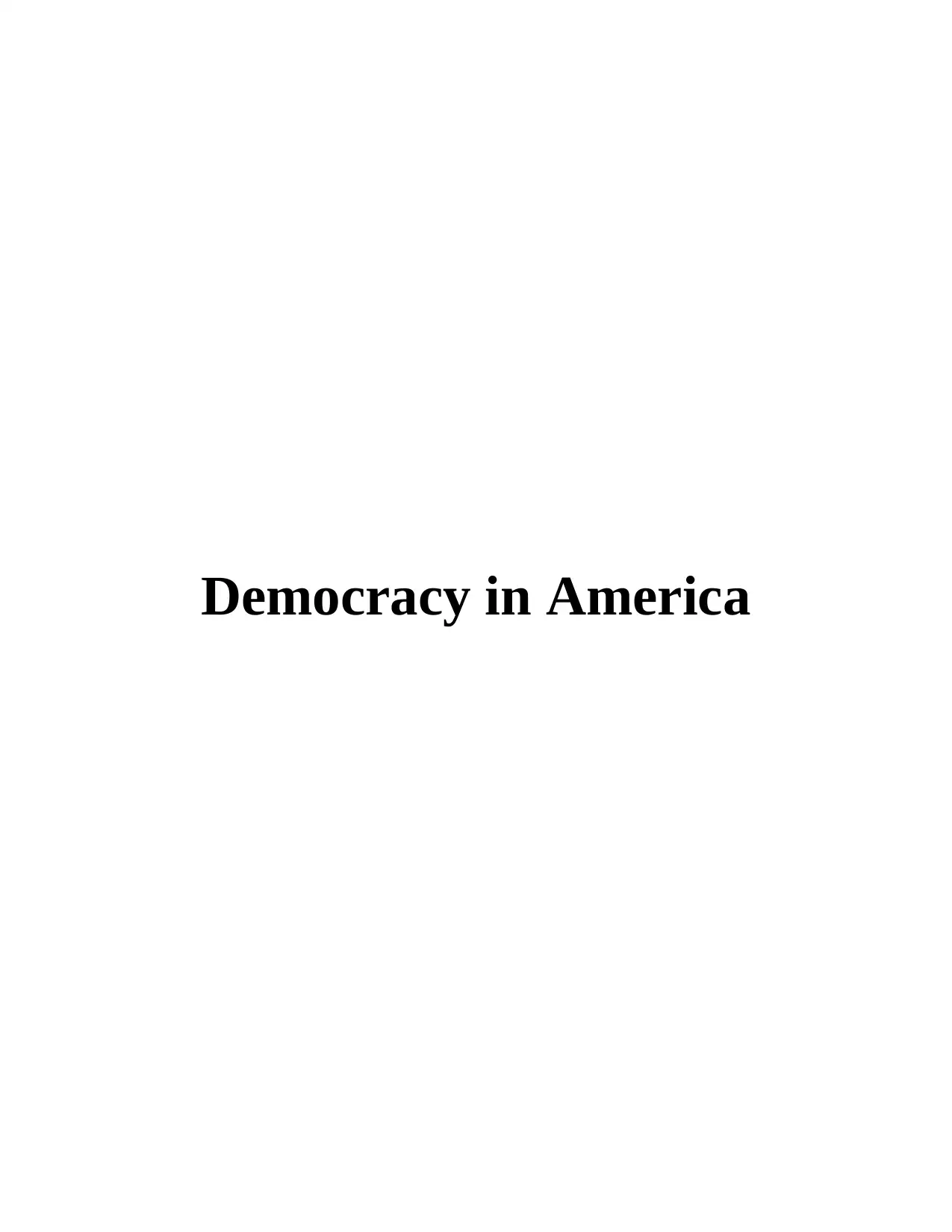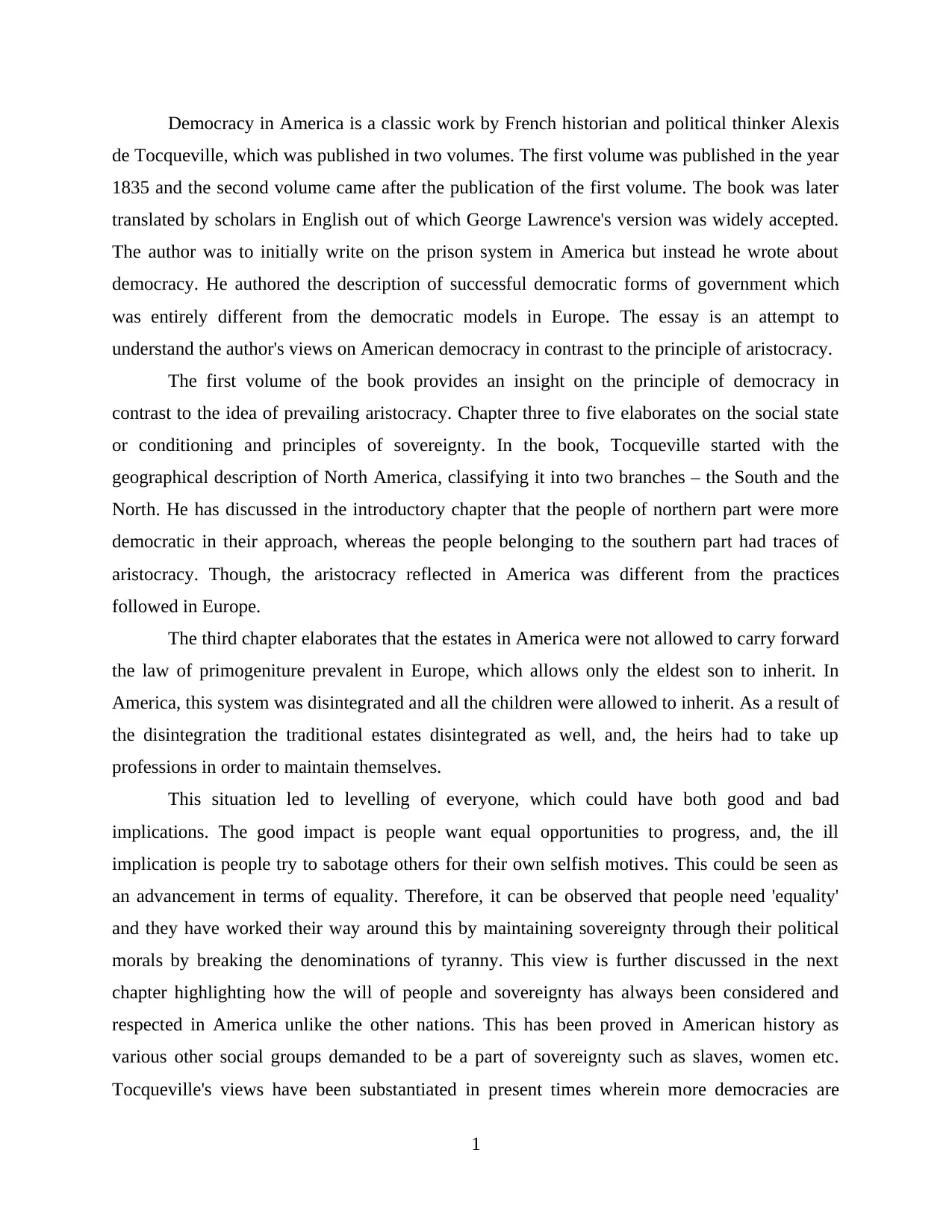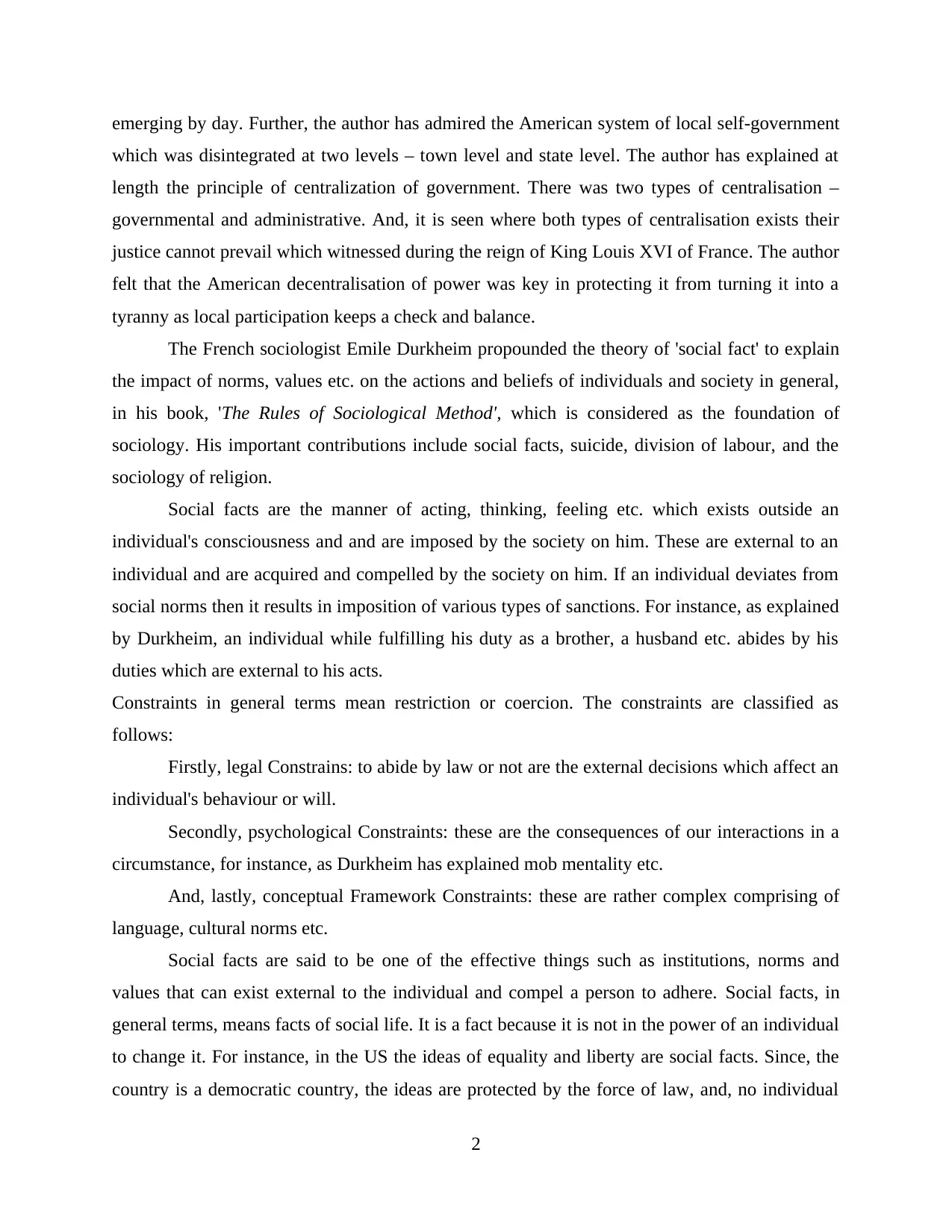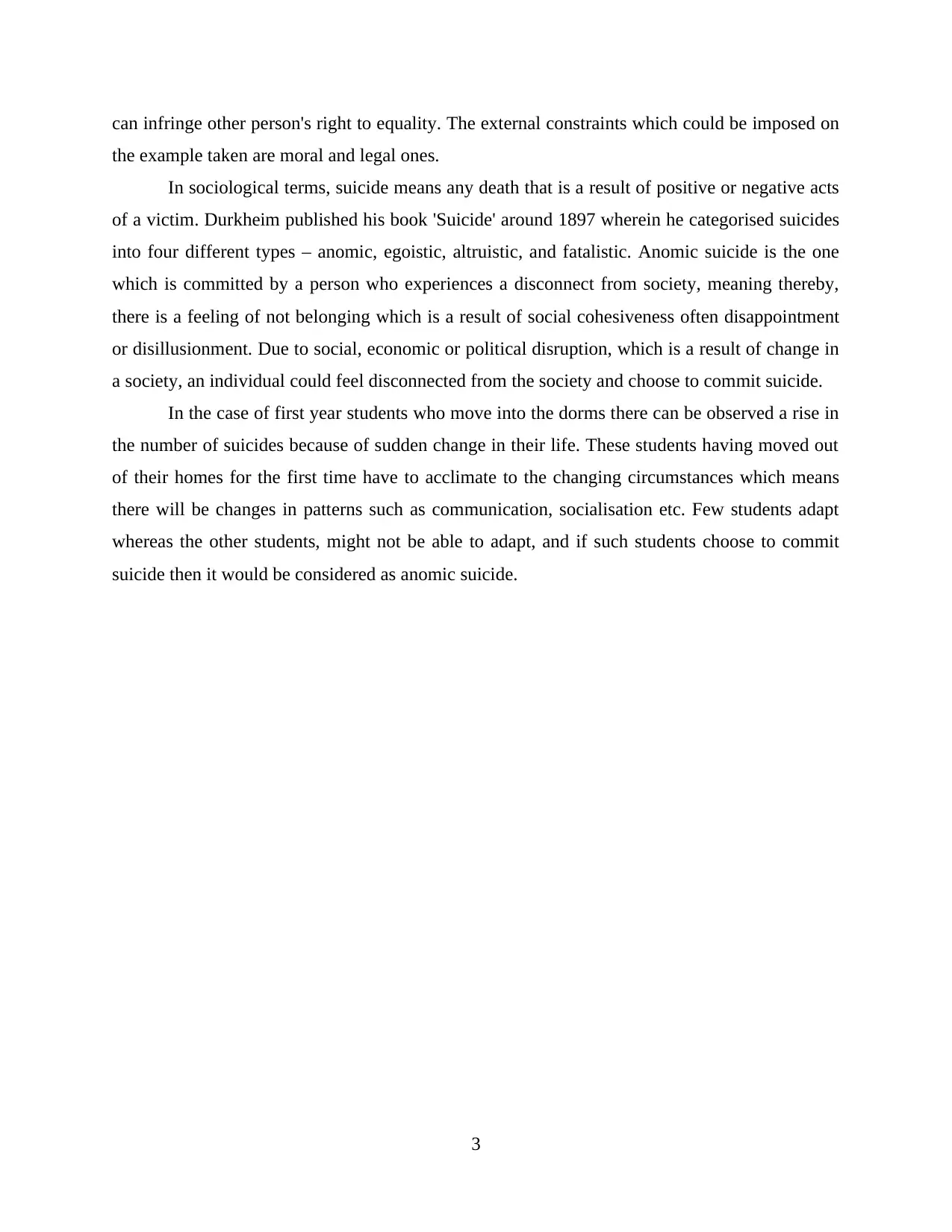A Critical Analysis of Tocqueville's Democracy in America
VerifiedAdded on 2020/10/22
|4
|1194
|371
Essay
AI Summary
This essay provides an analysis of Alexis de Tocqueville's 'Democracy in America', examining his observations on American democracy in contrast to European aristocracy. The essay delves into Tocqueville's geographical classification of America, the principles of sovereignty, and the impact of equality. It further explores the American system of local self-government and the concept of centralization of government. The essay also incorporates Emile Durkheim's sociological theories, including social facts, and his classification of suicide, particularly anomic suicide, providing examples to illustrate these concepts. The essay effectively links Tocqueville's political insights with Durkheim's sociological perspectives to offer a comprehensive understanding of democracy, social structures, and individual behavior.

Democracy in America
Paraphrase This Document
Need a fresh take? Get an instant paraphrase of this document with our AI Paraphraser

Democracy in America is a classic work by French historian and political thinker Alexis
de Tocqueville, which was published in two volumes. The first volume was published in the year
1835 and the second volume came after the publication of the first volume. The book was later
translated by scholars in English out of which George Lawrence's version was widely accepted.
The author was to initially write on the prison system in America but instead he wrote about
democracy. He authored the description of successful democratic forms of government which
was entirely different from the democratic models in Europe. The essay is an attempt to
understand the author's views on American democracy in contrast to the principle of aristocracy.
The first volume of the book provides an insight on the principle of democracy in
contrast to the idea of prevailing aristocracy. Chapter three to five elaborates on the social state
or conditioning and principles of sovereignty. In the book, Tocqueville started with the
geographical description of North America, classifying it into two branches – the South and the
North. He has discussed in the introductory chapter that the people of northern part were more
democratic in their approach, whereas the people belonging to the southern part had traces of
aristocracy. Though, the aristocracy reflected in America was different from the practices
followed in Europe.
The third chapter elaborates that the estates in America were not allowed to carry forward
the law of primogeniture prevalent in Europe, which allows only the eldest son to inherit. In
America, this system was disintegrated and all the children were allowed to inherit. As a result of
the disintegration the traditional estates disintegrated as well, and, the heirs had to take up
professions in order to maintain themselves.
This situation led to levelling of everyone, which could have both good and bad
implications. The good impact is people want equal opportunities to progress, and, the ill
implication is people try to sabotage others for their own selfish motives. This could be seen as
an advancement in terms of equality. Therefore, it can be observed that people need 'equality'
and they have worked their way around this by maintaining sovereignty through their political
morals by breaking the denominations of tyranny. This view is further discussed in the next
chapter highlighting how the will of people and sovereignty has always been considered and
respected in America unlike the other nations. This has been proved in American history as
various other social groups demanded to be a part of sovereignty such as slaves, women etc.
Tocqueville's views have been substantiated in present times wherein more democracies are
1
de Tocqueville, which was published in two volumes. The first volume was published in the year
1835 and the second volume came after the publication of the first volume. The book was later
translated by scholars in English out of which George Lawrence's version was widely accepted.
The author was to initially write on the prison system in America but instead he wrote about
democracy. He authored the description of successful democratic forms of government which
was entirely different from the democratic models in Europe. The essay is an attempt to
understand the author's views on American democracy in contrast to the principle of aristocracy.
The first volume of the book provides an insight on the principle of democracy in
contrast to the idea of prevailing aristocracy. Chapter three to five elaborates on the social state
or conditioning and principles of sovereignty. In the book, Tocqueville started with the
geographical description of North America, classifying it into two branches – the South and the
North. He has discussed in the introductory chapter that the people of northern part were more
democratic in their approach, whereas the people belonging to the southern part had traces of
aristocracy. Though, the aristocracy reflected in America was different from the practices
followed in Europe.
The third chapter elaborates that the estates in America were not allowed to carry forward
the law of primogeniture prevalent in Europe, which allows only the eldest son to inherit. In
America, this system was disintegrated and all the children were allowed to inherit. As a result of
the disintegration the traditional estates disintegrated as well, and, the heirs had to take up
professions in order to maintain themselves.
This situation led to levelling of everyone, which could have both good and bad
implications. The good impact is people want equal opportunities to progress, and, the ill
implication is people try to sabotage others for their own selfish motives. This could be seen as
an advancement in terms of equality. Therefore, it can be observed that people need 'equality'
and they have worked their way around this by maintaining sovereignty through their political
morals by breaking the denominations of tyranny. This view is further discussed in the next
chapter highlighting how the will of people and sovereignty has always been considered and
respected in America unlike the other nations. This has been proved in American history as
various other social groups demanded to be a part of sovereignty such as slaves, women etc.
Tocqueville's views have been substantiated in present times wherein more democracies are
1

emerging by day. Further, the author has admired the American system of local self-government
which was disintegrated at two levels – town level and state level. The author has explained at
length the principle of centralization of government. There was two types of centralisation –
governmental and administrative. And, it is seen where both types of centralisation exists their
justice cannot prevail which witnessed during the reign of King Louis XVI of France. The author
felt that the American decentralisation of power was key in protecting it from turning it into a
tyranny as local participation keeps a check and balance.
The French sociologist Emile Durkheim propounded the theory of 'social fact' to explain
the impact of norms, values etc. on the actions and beliefs of individuals and society in general,
in his book, 'The Rules of Sociological Method', which is considered as the foundation of
sociology. His important contributions include social facts, suicide, division of labour, and the
sociology of religion.
Social facts are the manner of acting, thinking, feeling etc. which exists outside an
individual's consciousness and and are imposed by the society on him. These are external to an
individual and are acquired and compelled by the society on him. If an individual deviates from
social norms then it results in imposition of various types of sanctions. For instance, as explained
by Durkheim, an individual while fulfilling his duty as a brother, a husband etc. abides by his
duties which are external to his acts.
Constraints in general terms mean restriction or coercion. The constraints are classified as
follows:
Firstly, legal Constrains: to abide by law or not are the external decisions which affect an
individual's behaviour or will.
Secondly, psychological Constraints: these are the consequences of our interactions in a
circumstance, for instance, as Durkheim has explained mob mentality etc.
And, lastly, conceptual Framework Constraints: these are rather complex comprising of
language, cultural norms etc.
Social facts are said to be one of the effective things such as institutions, norms and
values that can exist external to the individual and compel a person to adhere. Social facts, in
general terms, means facts of social life. It is a fact because it is not in the power of an individual
to change it. For instance, in the US the ideas of equality and liberty are social facts. Since, the
country is a democratic country, the ideas are protected by the force of law, and, no individual
2
which was disintegrated at two levels – town level and state level. The author has explained at
length the principle of centralization of government. There was two types of centralisation –
governmental and administrative. And, it is seen where both types of centralisation exists their
justice cannot prevail which witnessed during the reign of King Louis XVI of France. The author
felt that the American decentralisation of power was key in protecting it from turning it into a
tyranny as local participation keeps a check and balance.
The French sociologist Emile Durkheim propounded the theory of 'social fact' to explain
the impact of norms, values etc. on the actions and beliefs of individuals and society in general,
in his book, 'The Rules of Sociological Method', which is considered as the foundation of
sociology. His important contributions include social facts, suicide, division of labour, and the
sociology of religion.
Social facts are the manner of acting, thinking, feeling etc. which exists outside an
individual's consciousness and and are imposed by the society on him. These are external to an
individual and are acquired and compelled by the society on him. If an individual deviates from
social norms then it results in imposition of various types of sanctions. For instance, as explained
by Durkheim, an individual while fulfilling his duty as a brother, a husband etc. abides by his
duties which are external to his acts.
Constraints in general terms mean restriction or coercion. The constraints are classified as
follows:
Firstly, legal Constrains: to abide by law or not are the external decisions which affect an
individual's behaviour or will.
Secondly, psychological Constraints: these are the consequences of our interactions in a
circumstance, for instance, as Durkheim has explained mob mentality etc.
And, lastly, conceptual Framework Constraints: these are rather complex comprising of
language, cultural norms etc.
Social facts are said to be one of the effective things such as institutions, norms and
values that can exist external to the individual and compel a person to adhere. Social facts, in
general terms, means facts of social life. It is a fact because it is not in the power of an individual
to change it. For instance, in the US the ideas of equality and liberty are social facts. Since, the
country is a democratic country, the ideas are protected by the force of law, and, no individual
2
⊘ This is a preview!⊘
Do you want full access?
Subscribe today to unlock all pages.

Trusted by 1+ million students worldwide

can infringe other person's right to equality. The external constraints which could be imposed on
the example taken are moral and legal ones.
In sociological terms, suicide means any death that is a result of positive or negative acts
of a victim. Durkheim published his book 'Suicide' around 1897 wherein he categorised suicides
into four different types – anomic, egoistic, altruistic, and fatalistic. Anomic suicide is the one
which is committed by a person who experiences a disconnect from society, meaning thereby,
there is a feeling of not belonging which is a result of social cohesiveness often disappointment
or disillusionment. Due to social, economic or political disruption, which is a result of change in
a society, an individual could feel disconnected from the society and choose to commit suicide.
In the case of first year students who move into the dorms there can be observed a rise in
the number of suicides because of sudden change in their life. These students having moved out
of their homes for the first time have to acclimate to the changing circumstances which means
there will be changes in patterns such as communication, socialisation etc. Few students adapt
whereas the other students, might not be able to adapt, and if such students choose to commit
suicide then it would be considered as anomic suicide.
3
the example taken are moral and legal ones.
In sociological terms, suicide means any death that is a result of positive or negative acts
of a victim. Durkheim published his book 'Suicide' around 1897 wherein he categorised suicides
into four different types – anomic, egoistic, altruistic, and fatalistic. Anomic suicide is the one
which is committed by a person who experiences a disconnect from society, meaning thereby,
there is a feeling of not belonging which is a result of social cohesiveness often disappointment
or disillusionment. Due to social, economic or political disruption, which is a result of change in
a society, an individual could feel disconnected from the society and choose to commit suicide.
In the case of first year students who move into the dorms there can be observed a rise in
the number of suicides because of sudden change in their life. These students having moved out
of their homes for the first time have to acclimate to the changing circumstances which means
there will be changes in patterns such as communication, socialisation etc. Few students adapt
whereas the other students, might not be able to adapt, and if such students choose to commit
suicide then it would be considered as anomic suicide.
3
1 out of 4
Your All-in-One AI-Powered Toolkit for Academic Success.
+13062052269
info@desklib.com
Available 24*7 on WhatsApp / Email
![[object Object]](/_next/static/media/star-bottom.7253800d.svg)
Unlock your academic potential
Copyright © 2020–2026 A2Z Services. All Rights Reserved. Developed and managed by ZUCOL.
